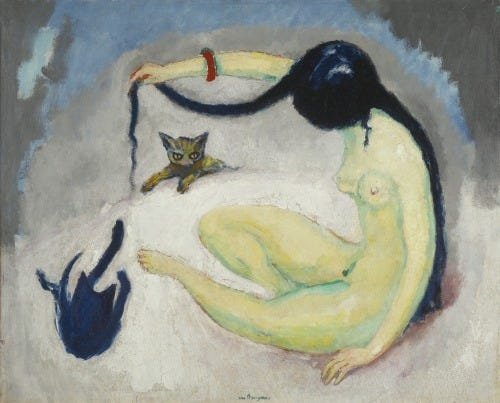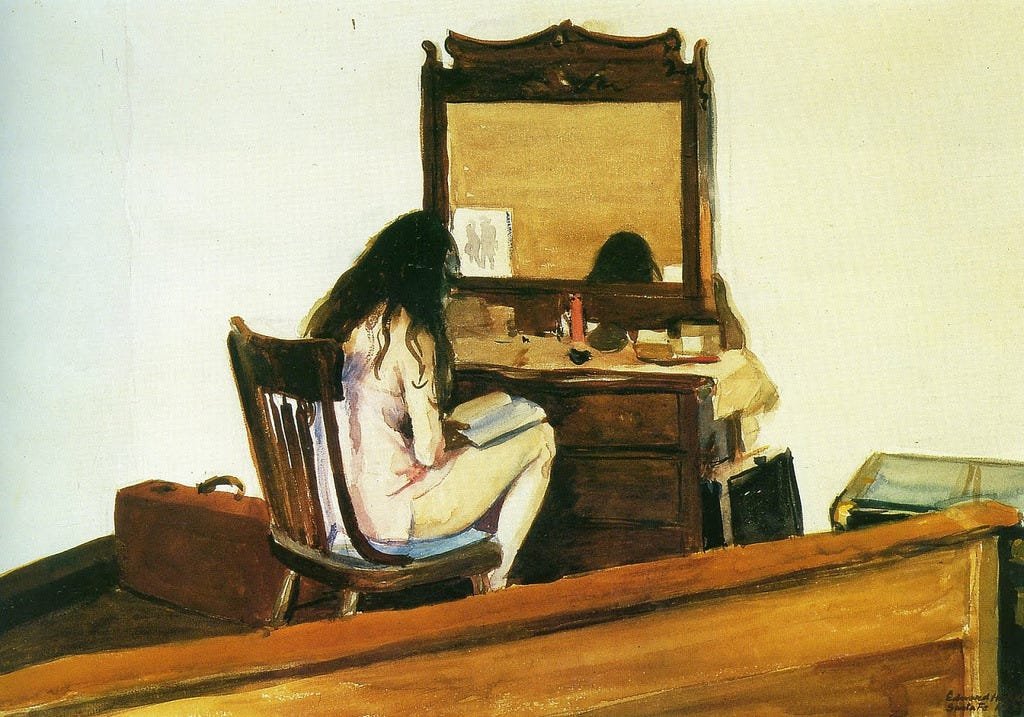The Para-Social Relationship to Our Past Self
According to the website 'FindAPsychologist.org,' a parasocial relationship is a one-sided connection where one person invests emotional energy, interest, and time, while the other party, often a public figure or persona, remains completely unaware of the individual's existence. In today's age of passive documentation, where iPhone cameras and Apple+ storage enable us to capture every moment, this dynamic reflects how many of us are beginning to view and interact with our past selves.
I’ve begun to notice a recurring experience where I'm at home, texting with friends and sending photos of ourselves from past trips, summer days, graduations. We reminisce, looking at ourselves in bright bikinis or favourite dresses, encouraging each other to remember. 'See my hair, my skin, my body. Wasn't I tanner, stronger, thinner? I had better posture, whiter teeth, clearer skin. Somewhere along the way, the 'I's in the texts metamorphose into third-person language, transitioning from descriptions of physicality into abstract statements. 'Wasn't she happier, fuller, more charming? Isn't she better?' It's as though the person on the pixelated, two-dimensional screen isn't the same as the one unraveling in front of me. We sit there, our faces so close to our phone screens that our noses nearly press against the glass, inching closer for a more thorough investigation, praying to nothing to be our past selves again. To turn our bodies back - a month ago or a year ago. It doesn't matter. It’s insane.
Yet, there is a certain comfort in this vain self-flagellation, in despising ourselves for not being who we were previously. Primarily because wanting to be your past self sits in a sweet spot - nuzzled between the impossible (and thus uninterruptible) and the feasible. We cannot endlessly hate ourselves for failing to be someone we have never been. However, we can harbor self-criticism for not measuring up to our past selves, for losing our footing on the path to self-improvement.
When I speak to my mother, the pursuit of beauty she experienced was largely rooted in the public sphere. Beautiful women existed in magazines or music videos. You would buy a copy or watch a movie and yearn to attain that same level of grace. Yes, to have her skin and her teeth, but also to step into the carefully curated fantasy of the unknown. Then, the magazine pages would run out, or the film's credits would roll, marking the end of fixation on another glamorous woman. Which is more importantly an anonymous woman whose grey areas of imperfection are filled in by imagination. In the end, there was a halt to the longing. A stop in the tracks of pining.
Today, in 2023, the longing to be another woman has broadened to not only include the public sector but also the private domain. The most intimate arena. A newfound longing to be a fleeting version of ourselves. Technology has progressed to the point we are able to capture every moment of our lives. The oldest image I have on my phone is dated June 15, 2017. I’m seventeen years old and living in London for the first time. In the photo my long undyed hair sweeps far down below my shoulders. My cheeks are plump and rosy, safe in time when I didn't know what buccal fat was. Too unaware to partake in the absurdity of hating it.
The most recent photo of myself shows me sitting on a sidewalk, red in the face, documenting a morning coffee. Stuffed between these two images is a sea of snapshots. 19, 794 to be exact. Many selfies, mirror photos, pictures of me in the summer, on vacation, crying on public transport, sitting in an airport. I have photos to document six different hair styles, different fashion styles, and different states of my ‘acne journey’. Key word ‘journey’, an ongoing, long winding experience - all caught on camera. Photos taken on different phones throughout the years, ranging from the iPhone 8 to 12. Each year the images become progressively more crisp, each pore more discernible. I have so many photos of myself, from every angle, in every form of lighting that on nights when I plummet into a spell of endless comparison it is almost as though my past self could tumble out of the screen and fall into bed beside me.
Sometimes my camera roll feels like a graveyard where organization goes to die. I have screenshots of things I anxiously think I’ll need again soon, a blurry receipt, a screenshot of an old address. When my thumb strokes from the top of my screen to the bottom of my phone it sends the chronological squares spiralling down. A plundering terrain of unsorted data. The only tidied up corners are bad photos of ourselves - eyesores that need to be binned before they hurt our head too much. What is left is a pseudo-filtered mess of our lives, where the best images of ourselves are returned to again and again. We start to believe the best selfie (‘favourited’ from of a set of forty) is a one off take. A human's memory is flimsy. We know this, then we forget it again.
I have friends who are so beautiful that walking down the street next to them feels like I'm floating. Each step nodding to the notion that the beauty of another never comes at the cost of our own. That in this new world, beauty is not finite. Yet, how does this admiration for another's image apply to ourselves? Will we ever live in a state where our past selves can finally rest, instead of being constantly stirred and unearthed for the mere purpose of tarnishing our self-esteem. Especially when our 'self' has always been our primary adversary. I used to stand in the doorway of my big sister's room and beg her to simply be with me. At times, I held my breath to make my presence so small that it was unnoticeable, terrified at the thought of being heard and kicked out, once again left with no one but myself. On the days she really needed peace, she'd bellow out, 'Learn to be your own best friend!' which felt like learning a new language without a teacher.
Now I’m grown, and more at peace when alone - on the bus to work or buying groceries. And when the day becomes very quiet and I have a moment to myself, I can’t help but think of the disproportionate weight this para-social relationship holds. My past self doesn’t know I exist. To her I’m nothing more than a semi-formed blur of anxiety and aspiration, while to me she’s my cruellest newfound crux for self-comparison.
Brynn Valentine is a trend forecaster based in London, UK. She holds a degree in economic anthropology from the University of Oxford, where she also contributed as a writer for the Oxford Blue and worked on the student-led magazine, The Burner.


